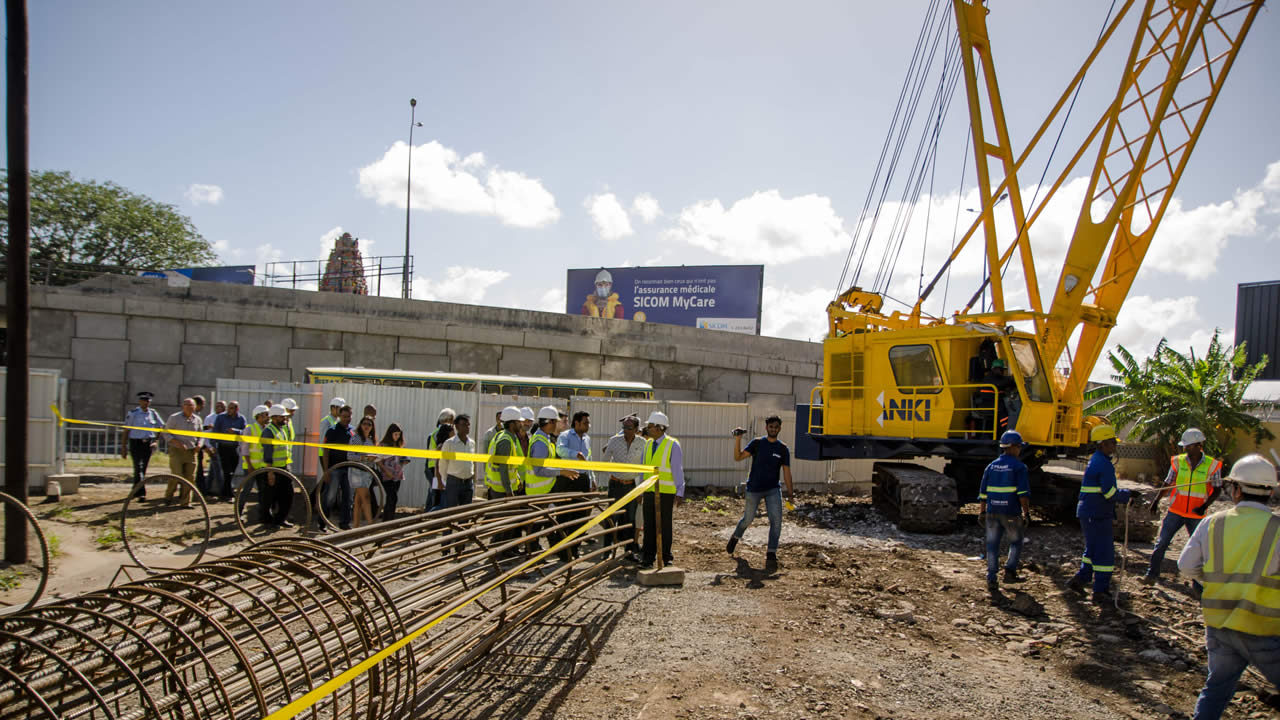
GDP Growth estimate for the year 2018 has given rise to controversy. While Statistics Mauritius had forecasted a growth of 3.9% in September 2018, it finally revised its forecast downwards to 3.8% in December 2018. In early November 2018, the MCB Group in its publication MCB Focus projected a growth of 3.7%, while SBM Insights put it at 3.9%
In his Budget Speech in June 2018, the Prime Minister and Finance Minister said the GDP growth was expected to be 4.1% for fiscal year 2018/2019. While different institutions predicted varying rates, Statistics Mauritius in December 2018 revised its forecast to 3.8%.
GDP Growth rate is giving rise to debates among economists, bureaucrats, politicians and observers. But is GDP growth rate a good indicator of economic welfare? Observers do agree that it measures income, but not equality, it measures growth, but not destruction, and it ignores values like social cohesion and the environment. Any increase in expenditure will boost GDP, even if that expenditure was inefficient.
For example, the cost overruns of the Terre Rouge/Verdun Road will be recorded as ‘economic growth’ even though they are not adding to the general welfare of the population. Similarly, when parents buy new school books every year because previous editions become obsolete as textbooks are revised almost annually, making it impossible for siblings to share books, this is recorded as ‘higher investment’ in education, yet it is a waste of resources that add no value. In 2017, there were 29,277 road accidents recorded.
The resulting costs in repairs and other related factors mean that the higher the number of accidents, the higher the growth! There are countless other examples that can demonstrate why the debate on economic growth is futile, making us lose sight of more pressing issues of the economy.
Official GDP growth rate does not also capture the underground economy, and Mauritius does have a sizable informal economy, the output of which is not captured by official statistics.
Investment
Will investment rebound this year? Official figures indicate that the investment rate in 2018 has been higher than the 2017 rate, and the trend will most likely continue in 2019. However, public investment is leading, with private investment lagging behind. In fact, in 2018 private investment growth rate was lower than in 2017, and in 2019 private investment seems unlikely to rise significantly. Public investment, on the other hand, is boosted by major infrastructural projects, some in progress since 2015/2016, others having started in 2018 and while more are to be launched this year. Major construction projects such the Metro Express, the Cote d'Or stadium, road and drain projects, among others, will continue to revitalise the construction sector this year. In the private sector, some projects have been delayed because of administrative obstacles or because of protests from activists, affecting mainly hotel projects.
However, there are other factors that can hinder investment, especially private investment, during this final year of the present government mandate. It is customary that at the end of a five-year term, investors prefer to wait for the installation of a new government to see whether there is any new economic orientation and package of incentives. Fortunately, the lack of private investment is being offset by an acceleration of public investment, as public projects tend to multiply when elections are approaching.
Other factors that may influence investment in 2019 include the new fiscal measures to be announced in the 2019/2020 Budget in June, the possible conclusions of the negotiations on the Mauritius-China Free Trade Agreement (FTA) and the Comprehensive Economic Cooperation and Partnership Agreement with India (CECPA). There are also external factors, such as the general elections in India, South Africa, the post-Brexit economic situation in the United Kingdom, the political situation in France, the economic deceleration in China, among others.
The last edition of ‘MCB Focus’ forecasts an improvement in the country's economic expansion, given the ongoing public projects. The MCB is of the opinion that private projects, especially in the real estate sector, will experience a new boom. The SBM, in its ‘SBM Insights’ analysis, shares the same opinion.
Economist Azad Jeetun, former director of the Mauritius Employers Federation, believes that the trend in the last two years will prevail in 2019. According to him, public investment will maintain its pace, while private investment will shy away. But why? He explains that the low economic growth rate does not motivate investors. "The current productive capacity is sufficient. If we look at our exports, there is not really any increase, so there is no demand for new equipment, infrastructure, just to name a few.” The economist says that the manufacturing sector is not really taking off, so private investment remains more or less stagnant.

Public debt: Worsening in 2019?
Public debt continues to rise drastically. At 30 September, the public debt level amounted to Rs 307 billion. At the end of September 2017, total public debt was at Rs 292 billion. Even in terms of percentage of GDP, there has been an increase in the public debt since December 2017, from 63.7% to 64.2% whereas a slight decline had been noted between June and December 2017. The debt is increasing because the country is multiplying funding agreements to carry out large-scale projects. The budget deficit is also leading to high indebtedness. According to observers, a high public debt is not necessarily catastrophic if the borrowed money is used to invest. It is however not recommended to borrow to consume.
Eric Ng, economist, expects a further increase in the overall public debt level this year, due to various ongoing or future projects. The economist says he is particularly concerned about cost overruns in the case of the Metro Express, which will have an impact on public debt. “The recent announcement of free tertiary education will also certainly have an impact on public debt,” he says.

But is a high debt level bad for the economy? Eric Ng explains that any loan must be used in income generating investment, to facilitate repayment. “If you borrow to build the Metro and it’s not viable, then it’s serious,” he says. “And if we borrow to offer free tertiary education, but we end up producing more unemployed graduates, then the investment is not worthwhile,” he adds. On the other hand, if we produce graduates that the economy needs, and they can work and diversify the economy and contribute to growth, then that is welcomed.
Dan Maraye, a chartered accountant and former governor of the Bank of Mauritius, says that with a public debt equivalent to nearly 64.3% of GDP, since we import twice as much as we export, and with domestic savings less than 10% of GDP, there is definitely a serious cause for concern.
| Public debt | Jun-17 | Sep-17 | Dec-17 | Mar-18 | Jun-18 | Sep-18 |
| Rs million | 290,103 | 292,501 | 291,449 | 293,403 | 300,164 | 307,275 |
| % of GDP | 65% | 64.80% | 63.70% | 63.30% | 63.70% | 64.20% |

2019: A new boost for entrepreneurship?

A new year always heralds new hopes and higher confidence for entrepreneurship. Opportunities abound but only those with the right flair will be able to pick them up. Economist Zohra Gunglee states that “Entrepreneurship is not a money-driven venture but a passion-driven one, and a real entrepreneur will strive against all odds to be successful”. She argues that entrepreneurship is the solution to unemployment, not only for school leavers but also for young graduates. Sheila Beekharee, small entrepreneur, says that there are still many obstacles that affect small businesses. “The role of the government in entrepreneurship should be that of a facilitator and not a controller.
It is not proper that small and large businesses are subject to the same regulatory measures. For example, both pay the same amount in fines or trade fees irrespective of their turnover,” she argues. The young entrepreneur adds that small businesses face too much paper work and this is not conducive to doing business.” Amar Deerpalsingh, president of the Federation of Small and Medium Enterprises, concurs with the view that small businesses are over regulated. “A small business cannot afford to employ specialist accountant or administrative officer to deal with all its paperwork, filing, submitting various types of returns, among others. When he delays, he is slapped with a huge fine,” he explains. He cites as example the case of return of employees submitted to the MRA, where there are so many frequent changes that it is the small entrepreneur who has to adapt himself to every new change. “This is a cost to business. All these procedures should be streamlined.”

New business practices
The tremendous impact of internet in business, which has obliterated geographical barriers, has made online start ups much easier. Many young minds may now set up online businesses in less than 24 hours, but municipal councils still take up to three months to approve a trade licence. “Online businesses have no physical principal place of doing business.
An online business might require only a laptop and an internet connection. Technically, someone might be sitting on the beach or in a public park and working at the same time, yet councils are asking for Building Permits in order to process a Trade Licence application for an online activity,” says Leena Koojun, another entrepreneur. She says that regulatory authorities should now keep pace with the evolving business world. She adds that once an entrepreneur gets an idea, it is imperative that the business is set up immediately. “If you wait for three months to get a permit, then your idea might become obsolete or someone else might start the
same thing.”
 J'aime
J'aime














